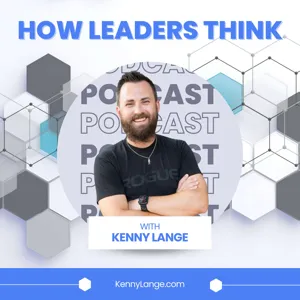Podcast Summary
Investing in a positive work environment leads to business success: Listening to customer requests, offering supportive work environments, and building a strong company culture can attract and retain top talent, leading to business growth.
Creating a positive and productive work environment can lead to business success. Ron Schake, a bakery owner, discovered this by listening to his customers' repeated requests and expanding his offerings, eventually leading to the creation of Panera. Similarly, the National Security Agency seeks exceptional individuals to contribute to innovative technology projects and offers a supportive work environment. NSA's mission requires constant innovation in areas like high-performance computing, artificial intelligence, and quantum computing. Additionally, Insparity, an HR provider, emphasizes the importance of company culture in driving business growth. By building a culture aligned with business goals, companies can attract and retain top talent, leading to success. So, whether it's in business or national security, investing in a positive work environment can yield significant rewards.
Unexpected experiences can lead to unexpected paths: Passions ignited by unexpected experiences can lead to unforeseen achievements and successes
Life can take unexpected turns, and experiences, even seemingly insignificant ones, can shape our future in profound ways. Ron Schake, a political science major with a passion for politics, was accused of shoplifting in college and, as a result, opened a convenience store instead. This experience sparked a love for business and entrepreneurship that eventually led him to open his own cookie store and then join the retail industry, ultimately becoming a successful businessman. The third place concept, which aimed to provide a welcoming environment for customers to linger and connect, played a significant role in Panera's success as one of the fastest-growing restaurant chains in the world. Ron's story serves as a reminder that unexpected experiences and passions can lead to unexpected paths and achievements.
Seizing opportunities despite initial challenges: Identifying opportunities and persisting through initial setbacks can lead to successful businesses and personal growth
Identifying and seizing opportunities can lead to the creation of successful businesses, even if the initial outcome does not meet expectations. The speaker, in this case, saw an opportunity to open an urban cookie store despite being told it wasn't viable. He faced numerous challenges, including securing funding and finding a suitable location. However, he persisted and eventually opened the "Cookie Jar" in downtown Boston. Despite a slow start, he saw potential in expanding the business and introduced French baked goods to attract customers during off-peak hours. The process of starting and growing the business brought him joy and a sense of accomplishment, even when it didn't meet his initial financial goals. The story highlights the importance of staying adaptable, persevering through challenges, and continuously seeking new opportunities.
Identifying and addressing operational inefficiencies in small businesses: Small business owners must be willing to identify and address operational issues to succeed, even if it means taking unconventional approaches and facing unexpected challenges.
Running a small business requires identifying and addressing operational inefficiencies and disorganization to ensure success. The speaker's experience with Obompan, a local Boston bakery chain, illustrates this point. Despite loving their product, the business was disorganized and lacked basic processes and disciplines. The speaker saw an opportunity to take over the business and improve its operations, leading to the creation of a new company. However, the journey was not without challenges. They experimented with unconventional methods, like using clothes dryers to remove water from frozen spinach, but faced unexpected setbacks, such as equipment malfunctions. Ultimately, the speaker's commitment to fixing the business and improving its operations paid off. The lesson here is that small business owners must be willing to identify and address operational issues to succeed, even if it means taking unconventional approaches and facing unexpected challenges.
From struggling business to national chain: Panera Bread's journey to success: Listening to customers, adapting to needs, and embracing new opportunities are key to business success. Panera Bread transformed with baguette sandwiches, Atlassian with AI collaboration.
Successful companies, like Panera Bread, don't happen overnight. They require a lot of grit, determination, and teamwork. Ron Shake, the founder of Panera Bread, turned a struggling small business into a national chain by listening to his customers and adapting to their needs. He saw an opportunity to sell sandwiches using baguettes as the platform, and this pivot transformed his business. Similarly, Atlassian, a company that creates software for team collaboration, is also on a mission to make the impossible a reality. Their latest innovation, Atlassian Intelligence, uses AI to help teams make faster, more informed decisions, glean new insights from data, and eliminate menial tasks. This empowers human-AI collaboration and accelerates work. Both Panera Bread and Atlassian demonstrate that success comes from being open to new opportunities, adapting to changing circumstances, and working together as a team. Whether it's in the world of business, space exploration, or making pizza, there's a lot about AI that companies should be excited about.
Oban Pan's Success in Urban Settings and Expansion into Suburbs: Oban Pan's success was rooted in a deeply committed team, enabling them to outperform competitors despite fewer resources. Acquiring St. Louis Bread Company expanded into suburbs with larger locations and lower costs, functioning as a gathering place and attracting suburban consumers.
The success of Oban Pan's French bakery cafe concept in urban settings led to rapid expansion and intense competition from larger food service companies. However, Oban Pan's advantage was its deeply committed team, allowing them to outperform competitors despite having fewer resources. Later, Oban Pan acquired St. Louis Bread Company, a small chain of sandwich shops, to expand into suburban markets. St. Louis Bread Company's larger locations and lower real estate costs enabled it to function as a gathering place and attract suburban consumers. Despite the acquisition, Oban Pen continued to focus on its urban strategy, ultimately becoming the dominant Baker Cafe operator in America.
Identifying market trends and having a clear vision: Ron Snyder's strategic decision to focus on the specialty food market and invest in Panera led to significant growth in the late 1990s.
Ron Snyder identified a trend towards consumers wanting more than just cheap, mass-produced food and saw an opportunity to dominate the specialty food market by combining it with a specialty bakery. He believed that Panera had the potential to become a nationally dominant brand and proposed to his board to sell off their other divisions and invest all resources into Panera. Despite initial skepticism, Snyder's vision paid off and Panera began to grow significantly by the late 1990s. This case study highlights the importance of identifying market trends and having a clear vision for a business's future.
CEO's decision to focus on Panera pays off: Smart business decisions during tough times can lead to significant growth. Focusing on core business and investing in growth can outperform competitors.
Focusing on what matters and making smart bets during challenging times can lead to significant growth. The CEO of Panera, Ron Shaich, faced a major struggle when his investors wanted to sell off three of his businesses to downsize and focus on Panera. Despite the emotional attachment to his previous businesses, Shaich saw the potential in Panera and fought to keep it. This decision paid off, as Panera's stock value increased dramatically in the following years. The company's success during the 2008 financial crisis was due in part to their contrarian approach of investing in growth during a time when most competitors were cutting costs. Shaich's fear of not meeting the expectations of his employees and stakeholders drove him to continually focus on the future and make informed decisions for the company. The partnership between Shaich and Lou Kane, his longtime business partner, was successful due to their complementary skills and mutual respect. Despite their differences, they shared a common goal and were able to navigate challenges together.
Partnership and Understanding: Successful partnerships thrive on complementary strengths and mutual understanding, but CEOs may need freedom to make long-term transformative bets, which can be harder in a public company.
Ron Shaikes and Lou Gentile's partnership in building Panera Bread was successful due to their complementary strengths and understanding of each other. However, Ron's concern for the company's ability to make long-term transformative bets in the public market led him to sell the company to a private entity. He emphasized that as a CEO, he needed the freedom to position his company for the future, which was harder to achieve in a public company. Now that he has stepped down as CEO, Ron enjoys the financial freedom that comes with success but remains deeply connected to Panera, visiting it frequently with his family. The entrepreneurial life, he emphasized, requires a deep commitment and dedication that goes beyond financial rewards.
Creating solutions from everyday challenges: Think creatively to solve everyday problems and discover new opportunities. Utilize effective tools and services like Squarespace and Audible to streamline operations and engage with customers.
Effective solutions can emerge from everyday challenges. In the story shared, Lisa, a woman who sells customized and commemorative bricks, felt terrible for disrupting her blind boyfriend Brian's memorization-based pantry organization system. She then thoughtfully came up with a solution using her 3D printer to create reusable braille labels. This simple yet innovative idea not only helped Brian but also led to a successful business opportunity when attendees at a National Federation of the Blind convention showed interest. On a different note, the discussion also highlighted the convenience and versatility of services like Squarespace and Audible. Squarespace offers features such as appointment scheduling, customizable email templates, and analytics, making it easier for business owners to manage their operations and engage with customers. Audible, on the other hand, provides access to a vast catalog of audio entertainment, offering a perfect companion for various journeys and interests. These stories demonstrate the power of creativity, determination, and adaptability in solving everyday problems and discovering new opportunities. Whether it's through innovative product ideas or utilizing effective tools and services, there's always room for growth and improvement.
Creating accessible tools leads to impactful businesses: Empathy and understanding people's needs can inspire innovative solutions, leading to successful businesses that bring independence and make a difference.
Passion and determination can lead to innovative solutions that make a significant impact on people's lives. Lisa Goldman's experience at a convention for people with visual impairments moved her to create Can-Do Labels, a business selling braille labels for $3 each. The demand for her product grew, leading her to recruit a friend to help with printing. National Braille Press also started selling her labels. Lisa's story highlights the importance of empathy and understanding people's needs to build products that bring independence and make a difference. Whether it's insurance, travel planning, or creating accessible tools, focusing on the human element can lead to successful businesses.





